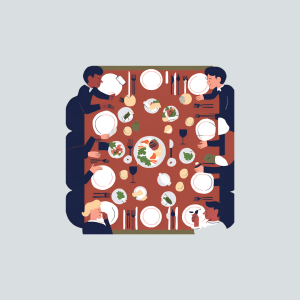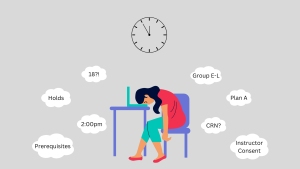Anti-Semitism, Islamophobia, Women of Islam, Interfaith Dialogue, and Immigration Law. These topics are not typically brought up at the dinner table. Table Manners 2.0 was an event hosted by the Middle Eastern Culture and Cuisine Association (MECCA) and the Rollins College Catholic Campus Ministry (RCCM).
The organized, open discussion was supported by the Office of Religious Life, and this was the second time it was hosted on campus this year.
Iman Gareeboo ’18 explained that “our goals are to help people talk about topics that they might find uncomfortable to talk about, or topics that they don’t know much about but would like to learn more of.”
Five different facilitators were present to discuss the different topics with the students and faculty who attended. This created an atmosphere that was completely open to questions. Rev. Katrina Jenkins, the Dean of Religious Life, said that this situation provided a perfect opportunity for “space and grace.”
I will recap a few of the conversations that I engaged in at some of the different tables.
Anti-Semitism:
Anti-Semitism can be described as hostility or prejudice towards Jews. One of the leaders of the Rollins Hillel group spoke with us about some of the current situations on campus, as well as at other colleges such as University of South Florida (USF), that have portrayed some aspects of anti-Semitism.
For instance, at USF the student organization Students for Justice in Palestine (SJP) held a protest by locking arms and creating a blockade on campus. They did not let students with Jewish beliefs through.
We discussed whether or not this action was politically motivated or a true anti-Semitism act. We learned that there are blurry lines between anti-Semitism and political motivations.
We also addressed how the Jewish community should react to these issues. It was shared with us that the Hillel at USF responded by keeping close connections with student government.
They decided that their stance will be to remain united and work together with the people that can help them, rather than fight back against the people that are hurting them.
We also discussed topics such as the inclusiveness of the Shabbat nights on campus, how everyone is welcome to the events put on by Hillel, and how they are looking for people to eat with them.
Women of Islam:
At the Women of Islam table, we mainly discussed oppression, the Koran, and the hijab.
As far as oppression is concerned, we discussed how people assume that there is oppression in the Islam religion. However, we must consider what oppression really is.
For example, Saudi Arabian women are not allowed to drive, and people see this as oppressive; however, our facilitator explained to us how this is simply the culture of the area. They said we must not confuse culture and religion.
Furthermore, if that is viewed as oppression, shouldn’t a 9-month pregnant woman still having to work because she does not revieve paid leave in some areas of the US be considered oppressive?
Or, what about women still not getting equal pay? We also learned that under the law of the Koran, men and women are equal; therefore, the idea of oppression is certainly not supported by Islam.
In addition, some new perspectives on the hijab were offered. The women we spoke to thought of the hijab as liberating.
They felt that people spoke to them with more respect and professionalism than their coworkers who did not wear the headdress. However, they did admit that younger women occasionally struggle with the idea of the hijab and do not always choose to wear them.
Yet, in one of the groups that the facilitator lead, she talked about how she teaches the girls not to judge each other. The wearing of the hijab is a personal decision and must be made between the individual and God.
Overall, it was a successful night with new connections made between faculty, students, and facilitators.
It offered a great space for questions, learning, and acceptance. Stay tuned for more upcoming events sponsored by RCCM and MECCA, which hope to continue inspiring open campus discussions on sensitive topics.
















Be First to Comment